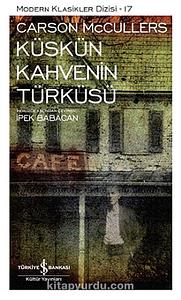Take a photo of a barcode or cover
I thought I had a solid working definition of "ballad" but didn't quite know how it would apply to a short story... and then I read The Ballad of the Sad Café and I understood. Anyway. Great little story. Can't say as much for the others in this collection, with the notable exception of “Madame Zilensky and the King of Finland”.
Wonderfully written but the story was quite boring, I was always excepting some kind of twist or explosive event to happen but I was let down. This story left me annoyed with many questions.
What else can I possibly say about the brilliance of Carson McCullers that hasn't already been said? Her ability to grasp and express human experience through the smallest of details is exquisite. The way that she writes how people dance around and with one another is subtle and sublime.
The last story story in the collection, entitled A Tree, A Rock, A Cloud, is now my favorite short story of all time. May we all take the time to teach ourselves how to love like the vagabond character did.
The last story story in the collection, entitled A Tree, A Rock, A Cloud, is now my favorite short story of all time. May we all take the time to teach ourselves how to love like the vagabond character did.
sad
medium-paced
Plot or Character Driven:
Character
Strong character development:
No
Loveable characters:
No
Diverse cast of characters:
No
Flaws of characters a main focus:
Yes
dark
sad
medium-paced
Plot or Character Driven:
Character
Strong character development:
Complicated
Loveable characters:
No
Diverse cast of characters:
No
Flaws of characters a main focus:
N/A
Graphic: Ableism, Physical abuse, Violence
Moderate: Racial slurs, Toxic relationship
sad
medium-paced
reflective
medium-paced
Plot or Character Driven:
Character
Strong character development:
N/A
Loveable characters:
Yes
Diverse cast of characters:
N/A
The title novella's Miss Amelia, with her way of dressing and behaving, had me wondering at first if she might be a grown-up Frankie (from [b:The Member of the Wedding|702459|The Member of the Wedding|Carson McCullers|https://d.gr-assets.com/books/1328031996s/702459.jpg|604941]), though perhaps Miss Amelia hasn't grown up, at least not in the conventional sense; and unconventional is certainly the word for the story's love triangle. The omniscient narrator's (balladeer's?) riffs on the lover and the beloved had me thinking of Proust, though the straightforward prose couldn't be more different from his.
The main character of "Wunderkind", a story written when McCullers was 17 and showing the promise that would come to fruition with her first novel, is named Frances, leading me back to Frankie, as Frances is Frankie's given name as well. In "Madame Zilensky and the King of Finland" the former is tall, something I was starting to see as a given with McCullers' females, in the same way "The Jockey" continues the characterization started off with Cousin Lymon in "Ballad" of very short males. The stories set in New York -- "The Sojourner" and "A Domestic Dilemma" -- remind me of an early short story by [a:William Maxwell|10772835|William Maxwell|https://d.gr-assets.com/authors/1419020743p2/10772835.jpg] called "Homecoming" (1938).
Along with "Ballad", most of these stories depict the illogical impossibility of love with its inherent loneliness: the final story, "A Tree, A Rock, A Cloud", offers a possible, though unlikely, solution to the universal predicament of pain-filled, unrequited love.
The main character of "Wunderkind", a story written when McCullers was 17 and showing the promise that would come to fruition with her first novel, is named Frances, leading me back to Frankie, as Frances is Frankie's given name as well. In "Madame Zilensky and the King of Finland" the former is tall, something I was starting to see as a given with McCullers' females, in the same way "The Jockey" continues the characterization started off with Cousin Lymon in "Ballad" of very short males. The stories set in New York -- "The Sojourner" and "A Domestic Dilemma" -- remind me of an early short story by [a:William Maxwell|10772835|William Maxwell|https://d.gr-assets.com/authors/1419020743p2/10772835.jpg] called "Homecoming" (1938).
Along with "Ballad", most of these stories depict the illogical impossibility of love with its inherent loneliness: the final story, "A Tree, A Rock, A Cloud", offers a possible, though unlikely, solution to the universal predicament of pain-filled, unrequited love.






